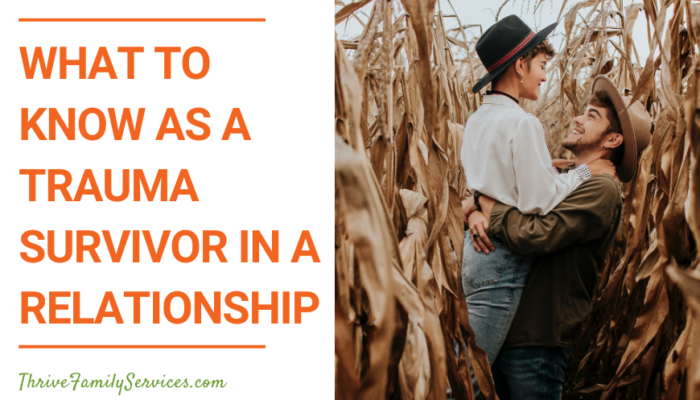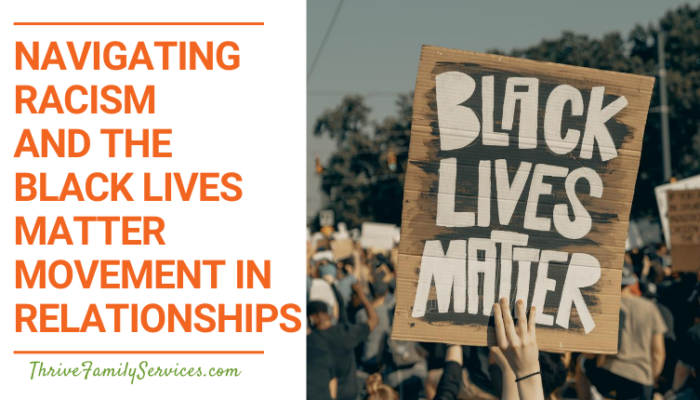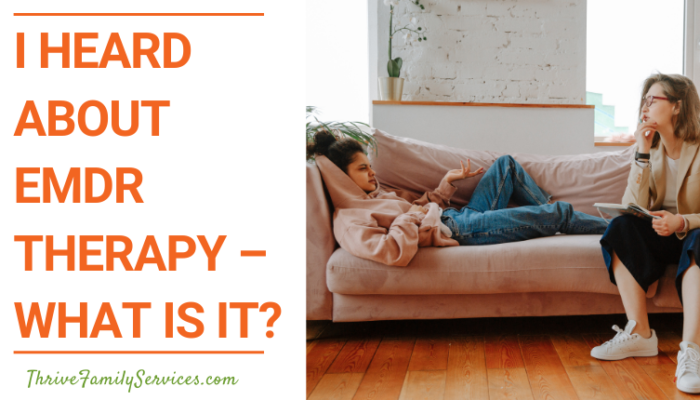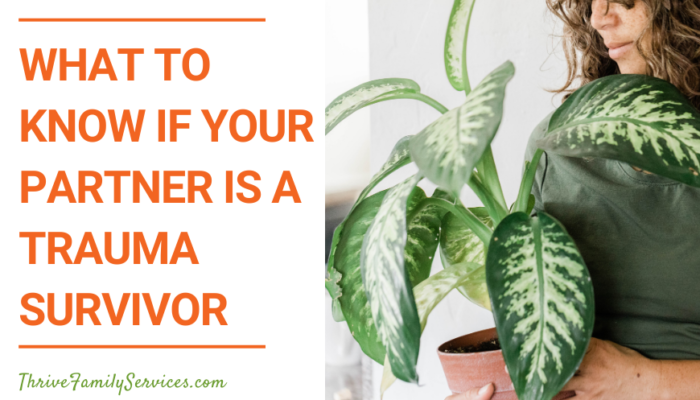We talked in our last post about what to know if you’re in a relationship with a trauma survivor, but what if you’re the survivor?
First, let us introduce you to the best description of a trauma survivor we’ve heard. Trauma survivors are people who have “endured more than most (EFT Trainer Kathryn Rheem).” You made it through the worst, and you figured out how to cope with that experience in the best way you knew how, often all on your own. You are a survivor!
Trauma can leave people feeling unsafe in close relationships or certain triggering situations, so it makes sense that it might be difficult to trust another person after experiencing trauma. As a species, we’re designed to want connection and safety, and relationships are how we connect with other people. It can be painful to feel caught between feeling unsafe in relationships but still desiring relationships with others.
Trauma and abuse can damage our sense of safety, especially when it occurs between a parent and child.
When you grow up experiencing relationships that make you feel unsafe, you may have a hard time feeling safe in relationships as an adult. Or, you may have certain situations that trigger feelings of unsafety, even when your cognitive brain knows you are safe, that this is now, not back then. The echoes of trauma can be very frustrating like that – uninvited upset in situations where you definitely didn’t want to be feeling unsafe.
Our blog on attachment theory describes it as:
“a research-supported concept that defines how childhood experiences impact adult relationships. ‘Attachment’ could be defined as a deep emotional bond that connects one person to another. For example, most infants develop an attachment to their parent(s) when they are born. However, it is important to note that attachment in humans does not develop solely on physical needs. It is, in fact, an emotional need.”
Trauma can impact our attachment style, but you are not stuck with whatever attachment style you developed as a child. You can change your attachment style, and the way to do that is through healing, connection, and safety.
In attachment-based Emotionally Focused Therapy, we focus on changing old patterns that are causing you pain. Your attachment style is a pattern you learned at a young age, but it can be changed, even if it’s all you know. You are not broken and you don’t need to feel this way forever.
If you’re a survivor of trauma, you can have great relationships too.
There are a lot of quotes out there about how you can’t love someone else until you love yourself or that you have to be ready to have a relationship, but that’s not the truth.
If you don’t feel ready to form relationships, that’s okay, but don’t feel as though you can’t have relationships until you’re perfectly healed. If you are a trauma survivor in a relationship, here are some things to keep in mind:
Disclose only what you are comfortable with
Start with tuning into your own body. What would you want a partner to know about you? What might feel healing to share? What might feel more distressing? Weighing these questions with a therapist is a great idea too if you’re not sure.
Even if someone asks you directly, you are allowed to decline to provide further details of your trauma. Being in a relationship with someone doesn’t entitle partners to all information, and it’s okay to keep things to yourself until you’re ready to share.
At the same time, it’s also important to ask for consent before disclosing something potentially triggering to someone else – not everyone is able to hear things like that. You can also be honest about yourself and your experiences without having to dive into your whole life story.
You might worry that disclosing your trauma might scare away a partner, but you don’t want to lie to them about something so important, either. It might be hard to share certain things. Vulnerability is important to relationships and it helps draw people closer together, but it can feel uncomfortable when you’re the one who is feeling wary of being very exposed.
Make sure your partner knows your signs of distress
We all show distress differently. We also all have different levels and styles of communication, and as much as we might wish they could, people can’t read our minds. To avoid misunderstandings and potential further traumatization, make sure your partner knows what to look out for when you’re in distress. Do you:
- Get angry?
- Go nonverbal?
- Have panic attacks?
- Cry or dissociate?
- Get physically ill?
If you’re not sure what it looks like when you’re distressed, ask someone close to you for things they’ve noticed. Keep a note on your phone to keep a running list of signs you’re distressed or dissociating or having a flashback. Keep a note that contains your triggers as well and add to it anytime you discover one or remember one. You can even keep a shared note with your partner so they’re always up to date.
You are loveable
Even if you weren’t loved the way you deserve in the past, you are still deeply and irrevocably loveable. You deserve love and you deserve to have a love that makes you feel safe and secure. Being a survivor doesn’t mean you aren’t worthy of love. Anyone who pushes you on your boundaries or doesn’t take you seriously is not worth your time.
Healing isn’t linear
You may have times where you think your healing is done, then something happens and you feel like you’re right back at square one. Especially in situations where we are dealing with another person whose mind we can’t read (aka relationships) there might be some unpredictability.
If that unpredictability is a trigger for you (or you find that it is, or the unpredictability of dealing with another person unearths some triggers for you) know that having a rough spot in your healing doesn’t mean all the work you’ve done toward healing so far is wasted.
Having a setback can be painful, and it can be hard when you’ve felt safe for a long time, but remember that healing takes a lifetime and healing takes community. You don’t need to start over and you don’t need to go it alone. You have spent a lifetime learning the patterns that led to trauma, and it takes a long time to unlearn.
Prepare your partner for good days and bad days
Survivors of trauma may react differently than non-survivors. Trauma responses aren’t a choice and they often aren’t “rational.” While your rational brain might know that you are safe, your partner is different from the person who hurt you before, your trauma reaction doesn’t know that. Trauma impacts our memories too, so being able to clearly explain to your partner why something upset you isn’t always possible.
What seems like no big deal to one partner may be triggering to the other, or cause them to respond in a way that seems inappropriate. Have a talk with your partner to prepare them for this – you see life through different lenses, so what seems small to them might be extremely painful for you.
Sometimes you might have a reaction because you felt triggered now, but the hurt goes way back. One trick to try is when you are upset with your partner, try to picture if there is someone metaphorically standing behind them. Is it someone else’s voice you hear in this moment when the upset is being aimed at your partner?
It’s ok to have expectations of your partner
While it’s not easy to be in any type of partnership, it might seem especially tricky to be in a relationship with a trauma survivor. However, you are worthy of a relationship that makes you feel safe and you are not too much of a burden.
Often, people don’t know, and are helped when they learn about trauma together to make sense of some of the things they experience. This is a great situation to get some support from a trauma-informed couples therapist, like we have here at Thrive. It’s distressing when we don’t understand what’s happening and why we might be getting stuck and it can be hugely relieving to understand together.
Practice investigating your feelings
When something comes up in relationships (and something always comes up!), people who have experienced trauma may have stronger reactions than non-survivors. When you have a strong reaction to something in your relationship, take some time to investigate it. If you’re too on edge to do it in the moment, wait until you’re feeling calm enough to do some digging.
What emotion was underneath that reaction? Was it fear of abandonment? Feelings of inadequacy? Feeling violated? Work through the emotion to see what’s underneath.
Get the support you need for your relationship
All relationships can be challenging as we learn to communicate and understand each other. Being a trauma survivor in a relationship can be more challenging because relationships can be very triggering to old wounds. It makes sense because a lot of trauma happens in relationships, whether romantic or familial.
Focus on things like making a serious self-care practice, getting help from a therapist (hopefully one trained to work in trauma), or a developing a supportive community who has your back. This can include a survivor’s group, your friends and loved ones, a yoga class, a spiritual advisor, or member of the clergy, etc.
Remember to get extra support
It helps to get extra support if you notice your trauma history is impacting your relationship. Getting help from a trauma therapist, safe friend or family member, trauma support group, or online survivors community can help a lot to feel well-supported.
Emotionally Focused Therapy is all about disrupting old patterns and rebuilding new patterns that will serve you and your relationship. Trauma, and our response to it, is an old pattern we’ve learned, and it will take time to unlearn. If you’re looking for support while you untangle those old patterns, our Denver counselors can help.




